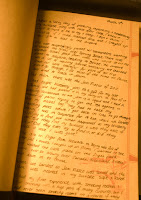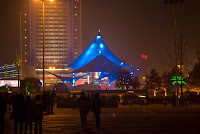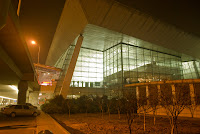vol. 8, No. 60 April 2011
Editorial
Where to begin? In nine days 21 people sat on planes for over 24 hours, slept on wooden frames, stayed with host families, experienced the squatty potty, haggled, and went on a six hour hike up and down a decrepit portion of the Great Wall. It is impossible to say that we went on that trip and came away with nothing.
COR 330-09, ChinaMojo, a mobile journalism course taught by Rob Williams met twice a week at 8am. The class consisted of 19 students, mostly juniors, but a few sophomores receiving credit as a communications or writing elective. Unless you were friends with people in the class before the trip, it was hard to get to know anybody. I mean, let’s be honest, how many people are wide awake and in a talkative mood that early on Mondays? Even if I hated the trip, I still would’ve come back with new friends. It’s kind of hard to spend that amount of time with the same people and not bond over one thing or the other.
The trip started Friday, March 4th at 4am at the Burlington International Airport. Before we even left the city we ran into our first speed bump. Our money transfer was lost for the first portion of the trip and wouldn’t be found until we were in Beijing the following Thursday. Between here and Wuhan, nothing major happened, a quick flight to Newark, a 13 ½ hour flight to Beijing, quick stop at the currency exchange and a two-hour flight to Wuhan. With the time change we basically skipped a day and when our feet hit the ground, it was Saturday night and we were exhausted, but our night didn’t end there. We met our coordinator of the Wuhan portion of the trip, Steve Wilmarth. Steve is a teacher at the HuaZhong Normal University, a high school of 6,000 students. We also met our tour guide, Linda, who was with us for the remainder of our stay in Wuhan. We were told that we weren’t even allowed to use tap water to brush our teeth, and after stopping at the hotel, we went on an excursion, exploring the night life of Wuhan in search of water. Along the way we had our first meals in China- McDonald’s and Starbucks. Stumbling back with sore feet and drooping eyes, most of us had a very unpleasant night’s sleep. The hotel opened our eyes to the Chinese way of sleeping- no heat and on a wooden frame with a thin mattress pad thrown on top.
Our first stop of the morning was breakfast at the Hubuxiang Market. Finally it was time to have some street food. Germophobs would have a panic attack once they stepped under the arch and into the street. The vendors smoked cigarettes and I wouldn’t say everything was completely sanitary, and most of the vendors didn’t speak English. Ordering food was this whole process of pointing to things, and holding up fingers. Everyone order different foods and passed them around because when in China, try everything. The rest of the day was spent driving around Wuhan learning the rules of Chinese law enforcement- there are none, and Uies are normal, even for tour buses. We went to the Yangtze River, the Temple of 500 Buddhas, the Hubei Province Historical Museum, and broke up into our host families. Unfortunately, my host family didn’t show, so my roommate, Ana Dempsey, and I slept in an empty faculty apartment for the night, but everyone had a different experience. That day was also the group’s first experience with the squatty potty. We were told ahead of time to pack a roll of toilet paper, but I don’t think most of us expected to find bathroom stalls with holes in the ground. Granted many of the bathrooms had automatic flushing, but it was hard to get used to.
March 7th the group spent touring HuaZhong Normal University and Central Chinese Normal University in Wuhan. During the weekly Flag Raising Ceremony, we stood on the steps in fr ont of an audience of 4,000 students, which wasn’t even the whole school. We were supposed to introduce ourselves, saying “Ni Hao, Wuhan, Wo Jiao NAME and I am studying XXXX at Champlain College,” but the student leaders of the ceremony were uninformed and dismissed the group before we got a chance. One of the most interesting parts of the day was seeing the high school’s library, which is off limits to students. We were told that it’s because the books were out of date, but many of the books were literature. How could Phantom of the Opera, Harry Potter, or James Bond ever get old? When the Communist Party representative was not around the group, we were informed that books inspire free-thinking. The university spent most of our time pitching their international masters program to us, in hopes that we would spend our money learning to speak Chinese for a year, and learning only that because most of our majors weren’t offered at the school. That was our last day in the city of Wuhan.
ont of an audience of 4,000 students, which wasn’t even the whole school. We were supposed to introduce ourselves, saying “Ni Hao, Wuhan, Wo Jiao NAME and I am studying XXXX at Champlain College,” but the student leaders of the ceremony were uninformed and dismissed the group before we got a chance. One of the most interesting parts of the day was seeing the high school’s library, which is off limits to students. We were told that it’s because the books were out of date, but many of the books were literature. How could Phantom of the Opera, Harry Potter, or James Bond ever get old? When the Communist Party representative was not around the group, we were informed that books inspire free-thinking. The university spent most of our time pitching their international masters program to us, in hopes that we would spend our money learning to speak Chinese for a year, and learning only that because most of our majors weren’t offered at the school. That was our last day in the city of Wuhan.
Congregating in front of the school early the following morning, we boarded the bus yet again for a 330km drive to our pick-up destination for the boat cruise. We stopped for a few hours in the city of Yieching where we ate in a cave on the side of a cliff, and climbed through a local cave, before getting back on the road to the Three Gorges Dam. The boat was blasting a CD that would be on repeat for the next two days that would not only play music in the afternoon, but would be the blaring wake-up call at 6am for breakfast. Now, you may be thinking that we were in the land of luxury, drifting down the Yangtze on a cruise boat, but you’d be terribly wrong. We were most likely the first foreigners ever to step foot on that boat or at least, the first US students. People would stare and take photos of us, which happened throughout the trip, especially if you had blonde hair. There were some who even asked to take a group photo with us. The boat was meant as a means of travel for the local citizens to move from city to city. Some of the rooms on the lower deck were four and six to a room, but ours were two, and most of our bathrooms had something wrong, whether it was the sinks didn’t drain, the toilet drained on to the floor, there was no hot water, or in order to flush the toilet, you had to kick the pipe because there wasn’t a lever.
After being woken up at the crack of dawn and witnessing the Chinese pile in to the dining room, shovel food  into their mouths, and leave in 15 minutes, we were boarding peapod boats that fit 17 people. We were handed orange life vests and told that only one person could stand at a time, or else the giant canoe would flip. An hour later we were back on dry land and visited the White Imperial Palace. It was 363 steps to the top, and the inside had been turned into a museum, complete with statues depicting historical scenes, and a garden. Junior Maxwell King had the right idea of paying people to carry him down the steps.
into their mouths, and leave in 15 minutes, we were boarding peapod boats that fit 17 people. We were handed orange life vests and told that only one person could stand at a time, or else the giant canoe would flip. An hour later we were back on dry land and visited the White Imperial Palace. It was 363 steps to the top, and the inside had been turned into a museum, complete with statues depicting historical scenes, and a garden. Junior Maxwell King had the right idea of paying people to carry him down the steps.
March 10th was spent traveling back to Beijing, where we learned that our hotel reservation was ‘lost.’ That weekend, Beijing was hosting a function for the Communist Party Leaders, and the location of our hotel was more to their liking, kicking us out. The bus ride back to Wuhan, Rob was on the phone with our friend Steve trying to find new sleeping arrangements. Upon arrival in the city we had to run to catch the train, only to find out that it stops at 11pm and we were only halfway to our destination. Luckily, with the help of Junior Andrew Chung, we were able to strike a deal with the cabbies and formed a taxi caravan. (Throughout the trip Andrew was saving our assses, whether it was helping us get from one location to the next, buy gifts, order food, or helping Rob aka Daddy Yak Fat Stacks exchange currency. Thank you, Andrew!) We seemed like we were in typical China, neon and paper lanterns everywhere, lots of big buildings, but then we turned down this sketchy alley, known as a hutong, a traditional Chinese neighborhood, arriving at the Green Tea Inn. By that time it was late, and most of the group passed out, while others went in search of food.
The most epic part of the trip was saved for last. Thursday we spent hiking up the ‘Wild’ Wall, a section of the great wall away from the tourism. Our tour guide was William Lindesay, the first foreigner to hike all 1,600 miles of the Great Wall in 1987. For six mile hike was filled with life trying to reclaim the Great Wall, snow, and ankle deep leaf piles. Friday we wandered through the Forbidden City, Tianamen Square, and were able to do most of our haggling in Pearl Market.
Our journey ended too quickly, with many things that we’d remember. The trip was really what you made it. Some ate chicken feet and coagulated pig’s blood; others ate McDonalds as much as possible. Some had to pay extra to check their luggage from all the stuff that was acquired throughout the trip, and others came home with some extra spending money. Although some things smelled awful, the bathrooms were an experience, and we only had two days of clear skies from the smog, everything sounds better when you add the words ‘in China.’
















